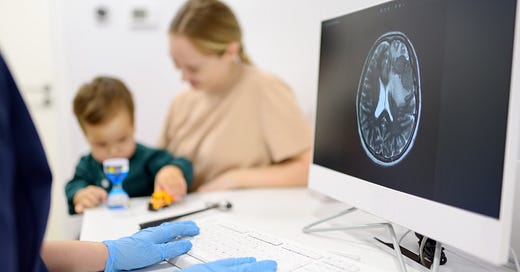Research Hit: Key Brain Development in Toddlers
Dramatic shift in processing of cognitive control between 10 and 16 months
But of course babies’ brain go through different development phases!
Yes, we know that already, but the actual research into how processing and the brain develops in human babies is pretty limited.
This is because of the many difficulties - it is hard and ethically challenging to scan babies brain at a large scale. A lot of the research into cognitive development has been done in the psychological space or using things like eye tracking technology.
This research managed to scan babies’ brains using a newer technology: something called functional near-infrared spectroscopy (fNIRS) which can be done with a skull cap and is hence much more practical but gives similar insights as functional magnetic resonance brain scanning (when you have to lie in a large magnetic tube).
Oh that’s interesting - and what did this research find then?
Indeed it is fascinating. Abigail Fiske et al. of the University of Bristol gave 103 toddlers a touchscreen tasks that involves inhibition i.e. resisting the urge to do something to complete the exercise.
These toddlers where scanned at 16-months old and completed the same exercise as an earlier study into toddlers at 10-months old.
And was there a difference?
Yes, indeed there was a dramatic difference.
10-month-olds used the right side of their prefrontal (the front of your brain is associated with cognitive control - but normally the left) and parietal cortex for inhibitory control according to the earlier study.
However in this study, the team found that by 16 months, toddlers use the left parietal cortex and both sides of the prefrontal cortex more extensively. A pattern that is more associated with adult brains.
Wow, and what does this mean?
Well, it is fascinating to see this shift but also shows that children’s brains developed in multiple ways - babies’ brains are not functional in the same way as adult brains but this develops as they grow. It also points to critical developmental phases and this period between 1 and 2-years old may be such just such a critical phase.
Did their inhibition skills develop also?
Well, the interesting thing is that in this study the activation pattern was not associated with better control - but that likely comes with time. That is also fascinating: it looks like the brain pattern shifts and then the skills develop later.
And we do develop this skill?
Yes, cognitive control develops into adulthood - well, for most of us! It is considered a critical life skill by many because it is involved in so much: development, education, and performance in multiple areas in life.
Abigail Fiske, Liam Collins-Jones, Carina de Klerk, et al.
The neural correlates of response inhibition across the transition from infancy to toddlerhood: An fNIRS study.
Imaging Neuroscience, 2024; 2: 1
DOI: 10.1162/imag_a_00206




